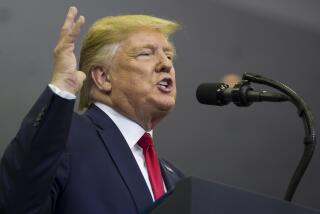Nightmare Scenario for U.S. Wanes
- Share via
WASHINGTON — For Americans, the main point to keep in mind about Asia’s deepening financial crisis is that it couldn’t have come at a better time. In a way, the United States is lucky.
Privately, Clinton administration officials tell themselves that things could be worse--much worse. Why? Because the Nightmare Scenario that has haunted Washington over the last decade doesn’t seem nearly so scary as it once was.
The worrisome story line went like this: Japan suddenly stops buying U.S. Treasury securities and dumps those it already owns. In effect, Japan decides it will no longer finance America’s debt. In the resulting chaos, interest rates in this country jump, making it impossible for the U.S. economy to grow.
The Nightmare Scenario often lay under the surface as America and Japan did business with one another. It gave Japan lots of leverage in its dealings with the Clinton administration.
Sometimes, Japan openly raised the specter of the Nightmare to get what it wanted from Washington. Prime Minister Ryutaro Hashimoto just last spring warned that the administration ought to watch out, “so we will not succumb to this temptation to sell off U.S. government bonds and switch our foreign reserves to gold.”
*
Usually, however, Japanese officials didn’t have to make such threats; American officials always realized how reliant this nation’s economy was upon money borrowed from Japan.
You’d think that the Nightmare Scenario would be even more terrifying than ever these days. Japan, after all, looks like it has been swept up in the turmoil that hit, first, Southeast Asia and, then, South Korea. On Monday, Yamaichi Securities folded in Japan’s biggest bankruptcy. And there will probably be more to come as Japan’s weaker banks are allowed to fail.
What if Japan needs to bring home some of the money it has been stashing in the United States? Or what if Tokyo threatens to do that, as a way of persuading U.S. officials to let Japan find its way to economic recovery primarily by exporting more goods to the United States?
Such prospects don’t seem to bother Washington as they would have a few years ago.
“Maybe it’s dumb luck, but now we’re in a position where we can tell [the Japanese] to bug off,” one administration official said this week. “We’re at a happenstance now where that is truly an empty threat.”
There are, essentially, two reasons why Japan’s financing of the American debt doesn’t matter as much as it used to. The first is that the U.S. budget deficit has come down to the point where the government isn’t borrowing much new money these days.
The other reason that it would make little sense for Japan to sell huge amounts of U.S. Treasury securities is that doing so these days would be counterproductive. The effect would be to push down the value of the dollar against the yen--thus making Japanese exports more expensive. That’s the last thing Japan wants right now.
This easing of worries about the Nightmare Scenario is important, because at the moment, there is a polite little tug-of-war between Washington and Tokyo over what to do about Japan’s economic plight.
Treasury Secretary Robert E. Rubin warned Japanese officials this month that they should not look to America as the solution to their problems. Don’t expect to be able to pump up sales of Japanese goods to the United States, Rubin said.
In response, Japanese officials have come to Washington pleading for understanding. Their message is that Japan is weak now and the U.S. ought to help out by purchasing more.
But administration officials, already worried about a trade deficit that will probably be the largest in U.S. history next year, are not buying Japan’s argument. And without the Nightmare Scenario, Japan can’t threaten the United States in the fashion it used to.
So does this mean that Clinton and his aides sleep soundly at night these days, believing that whatever happens in Asia won’t harm our economy?
No. In Washington, old fears are often replaced by new ones. So the administration is now spooked about Nightmare Scenario II.
The new fear is that the U.S. economy will slow down before Asia recovers. If that happens, American growth won’t be able to help Asia, and a slumping Asia will drag down the United States.
*
Whether you believe in Nightmare II depends on where you stand in a broader debate about the American economy: Has it entered a new era of seemingly unending growth, in which inflation and unemployment remain low? Or is the economy still subject to downturns, just as it always has been?
Those who believe in the “new paradigm”--that new technology and globalization have fundamentally changed the U.S. economy to make it virtually recession-proof--can look at the problems sweeping across Asia with equanimity.
In Washington, however, there are still many who think the United States has not yet abolished the business cycle. It will probably take at least another 18 months for Asian economies to recover. If economic growth in this country should slow down before that time, then the pessimists fear that Asia’s problems will make things a lot worse.
That’s the new nightmare, the reason Clinton administration officials are still staying up at night worrying about Asia.
More to Read
Sign up for Essential California
The most important California stories and recommendations in your inbox every morning.
You may occasionally receive promotional content from the Los Angeles Times.













